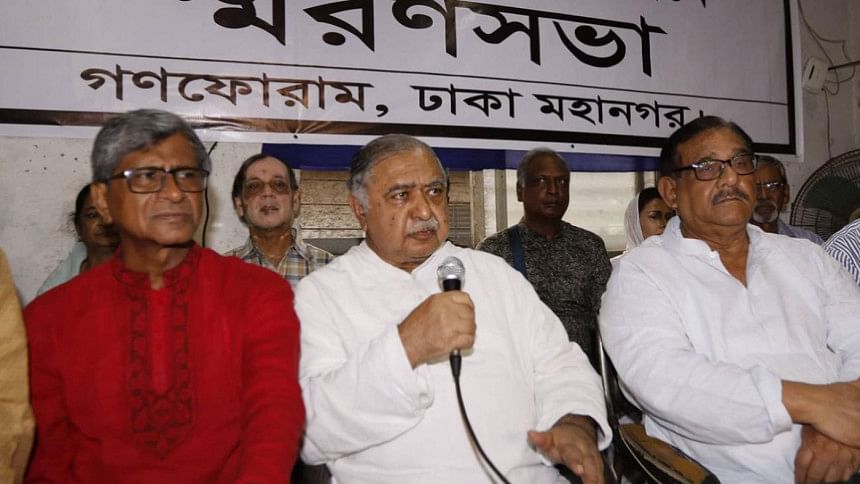After the dialogue, now what?

It was unsurprising that the much-hyped dialogue between the ruling and opposition alliances didn't yield notable signs of progress. To expect a three-hour meeting to sort out longstanding differences would be naive. It would also be impractical to expect the ruling party, Awami League, to relinquish so many of its bargaining chips so quickly.
In fact, far from letting go of any bargaining counter at all, the governing party may very well be buying time in the guise of talks, keeping the Oikyafront busy until the election schedule is announced. Also, the AL might have agreed to a dialogue just to avoid being seen as the one closing the door on the talks.
Nevertheless, the dialogue did break the ice. And, the fact that they agreed to sit for a second round of talks, slated to be held tomorrow, highlights both sides' willingness to devise a compromise.
***
To some in the BNP, the largest stakeholder of the opposition alliance the Oikyafront, the initial dialogue resulted in almost next to nothing and it stalled the Oikyafront's momentum. Their scepticism is well grounded.
Prime Minister Sheikh Hasina's decision to accept the offer of talks coincided with Khaleda Zia being sentenced to seven years in prison in a second graft case. The next day saw her sentence in the first case increased to 10 years.
And, the day after, a High Court bench ordered the Election Commission (EC) not to accept BNP's amended constitution, putting the leadership of Khaleda Zia and Tareque Rahman in jeopardy, at least in theory. Moreover, the fact that the ruling party expanded the periphery of the dialogue to other smaller parties certainly undercut its significance.
While Kamal Hossain, the Oikyafront chief, and Mirza Fakhrul Islam Alamgir, the BNP secretary general, remained unsatisfied, they did not state that it was an utter failure. Because it wasn't. The PM agreed to reconsider "political cases" against grassroots opposition activists and allow the opposition parties to hold rallies without hindrance in the run-up to the election. The Oikyafront has already decided to hold a rally in Dhaka on November 6, putting the government's promise to the test.
BNP may be particularly unhappy about the fact that the issue of Khaleda Zia and Tareque Rahman is highly unlikely to be resolved. But if it sets the bar of expectation that high, it would end up accomplishing nothing. It should focus on major election-related demands such as the dissolution of the Jatiyo Sangsad and the government before the election, deployment of the Army with magistracy power and handing over the charge of law enforcement agencies to the election commission.
***
The opposition alliance can challenge the Awami League's insistence over the issue of constitutionality. Kamal Hossain, at the initial dialogue, invoked AL's own demands when it was in the opposition to argue that the fundamental requirements, to hold a free and fair election, remained the same. "It's not unknown to you that the efforts to amend the constitution are also within the periphery of the constitution," he said to the prime minister.
Furthermore, Kamal Hossain, as well as other BNP leaders, believe that there are multiple ways to accommodate Oikyafront's demands within the existing constitutional framework. Khondker Mahbub Hossain, a BNP vice chairman, has given more hints in this regard. "Despite the fact that BNP has no member in the parliament, its representatives can be accommodated in the interim poll-time cabinet because the constitution allows technocrats in such cases," he explained in a recent programme. "The article 123 of the constitution says the parliament elections can be held in two ways. It can take place 90 days prior to the day parliament expires. So, if you (the prime minister) arrange the election after the parliament's expiration, both the sides can save face."
BNP's legal point man Moudud Ahmed has recently sat with independent legal experts such as Shahdeen Malik and Professor Asif Nazrul. "If there is political goodwill, there are at least 10 different provisions in the constitution for holding an election after dissolving the parliament," Shahdeen Malik told reporters after the meeting. "We believe that a free, fair and participatory election within the constitutional and legal framework is possible. We are discussing to find this way."
***
In the first round of talks, the Oikyafront was cautious, did not push the AL too far, and remained calm in the face of disparaging attacks from a Jasad leader. BNP also wisely refrained from resorting to street agitation even when its leader was jailed and given prison sentence.
The fact that the Oikyafront has gotten its message—that the constitution is no barrier—across to both the ruling party and the public is its biggest accomplishment. And, in the next round, it will further push forward with its own formula and theories.
Nazmul Ahasan is a member of the editorial team at The Daily Star. His Twitter handle is @nazmul_ahasan_





Comments